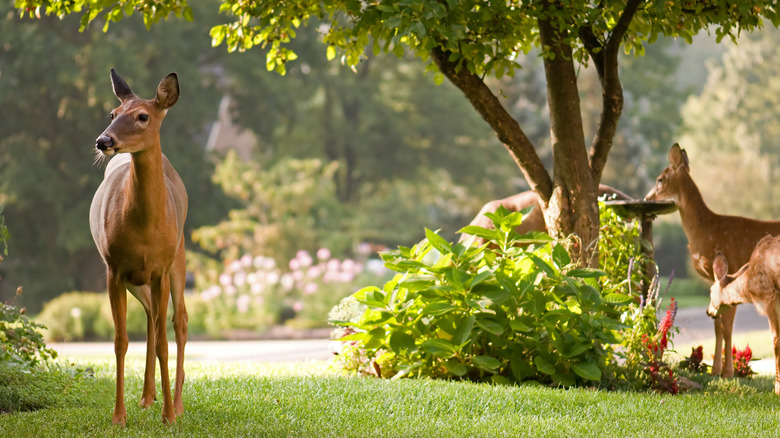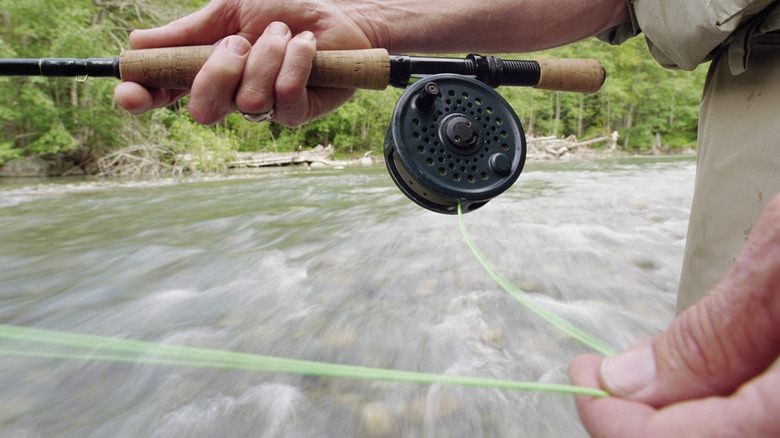This Fishing Line Hack Is The Secret To A Deer-Free Garden
Deer can be a gardener's nightmare. These graceful but voracious animals are known to feast on a wide variety of garden plants, from delicate flowers to robust vegetables. Their grazing habits can decimate entire gardens overnight, leading to frustration and significant losses for gardeners. Traditional methods to keep deer at bay include chemical repellents, fences, and noise-makers, but these solutions often come with drawbacks. Chemical repellents can be harmful to the environment and may require frequent reapplication. Fences, while effective, can be expensive, unsightly, and labor-intensive to install. Noise-makers might work temporarily but can become a nuisance to both the gardener and neighbors. Understanding the limitations of these methods is essential in seeking an alternative that is both effective and unobtrusive.
Deer are particularly troublesome because they are highly adaptable and persistent. They can jump high fences, ignore certain repellents, and quickly learn to bypass obstacles. Moreover, during certain seasons, especially in late winter and early spring, food becomes scarce, making your garden even more attractive. Given these challenges, gardeners need a solution that is both cost-effective and easy to implement. This is where the fishing line hack comes into play, offering an innovative and simple way to deter deer without the need for harsh chemicals or costly installations.
Implementing the fishing line hack
The fishing line hack leverages a deer's poor depth perception and their instinctual caution around unseen barriers. To implement this hack, you will need a spool of clear fishing line and a few sturdy stakes. Begin by driving the stakes into the ground around the perimeter of your garden. According to Abundant Mini Gardens, you should set up a fishing line between t-posts spaced no more than 16 feet apart. Drive the posts approximately 18 inches into the ground. Then, string the fishing line at 1-foot intervals up the posts, reaching a height of about 5 feet, using a 30-pound test monofilament. The clear fishing line is virtually invisible to deer, and when they encounter it, they become disoriented and wary, typically deciding to move on to an easier feeding ground.
This method works because deer, when they encounter an invisible barrier that they cannot see or understand, are likely to retreat rather than push through. The fishing line does not harm the deer; it merely acts as a psychological deterrent. One of the significant advantages of this technique is its cost-effectiveness and simplicity. Fishing line is inexpensive and easy to install, making it accessible for gardeners of all skill levels. Additionally, it doesn't detract from the aesthetic appeal of your garden, maintaining a natural and open look.
Enhancing and maintaining the barrier
While the fishing line hack is highly effective, combining it with other deterrent methods can enhance its efficacy. For instance, integrating scent-based repellents or planting deer-resistant plants around the perimeter can provide an added layer of protection. Another option is to use motion-activated sprinklers, which can startle deer and encourage them to stay away. Regularly check your fishing line barrier for any signs of wear or damage, especially after storms or strong winds, to ensure it remains intact and functional.
Consistency is key to maintaining a deer-free garden. Periodically inspect the fishing line and stakes to ensure they remain taut and properly positioned. Over time, you may find that deer learn to avoid your garden altogether, making maintenance easier. Additionally, educate yourself about the local deer population and their seasonal behaviors to anticipate periods of increased activity and adjust your deterrent methods accordingly.
When combined with other deterrent strategies, such as the soap method, a fishing line can significantly reduce the chances of deer feasting on your precious plants, ensuring your garden remains lush and productive throughout the growing season. That being said, if you do come across an adult deer, make sure you know what to do to stay safe. Of course, there's a different protocol to follow, as well, if a baby deer happens to get lost on your property.


